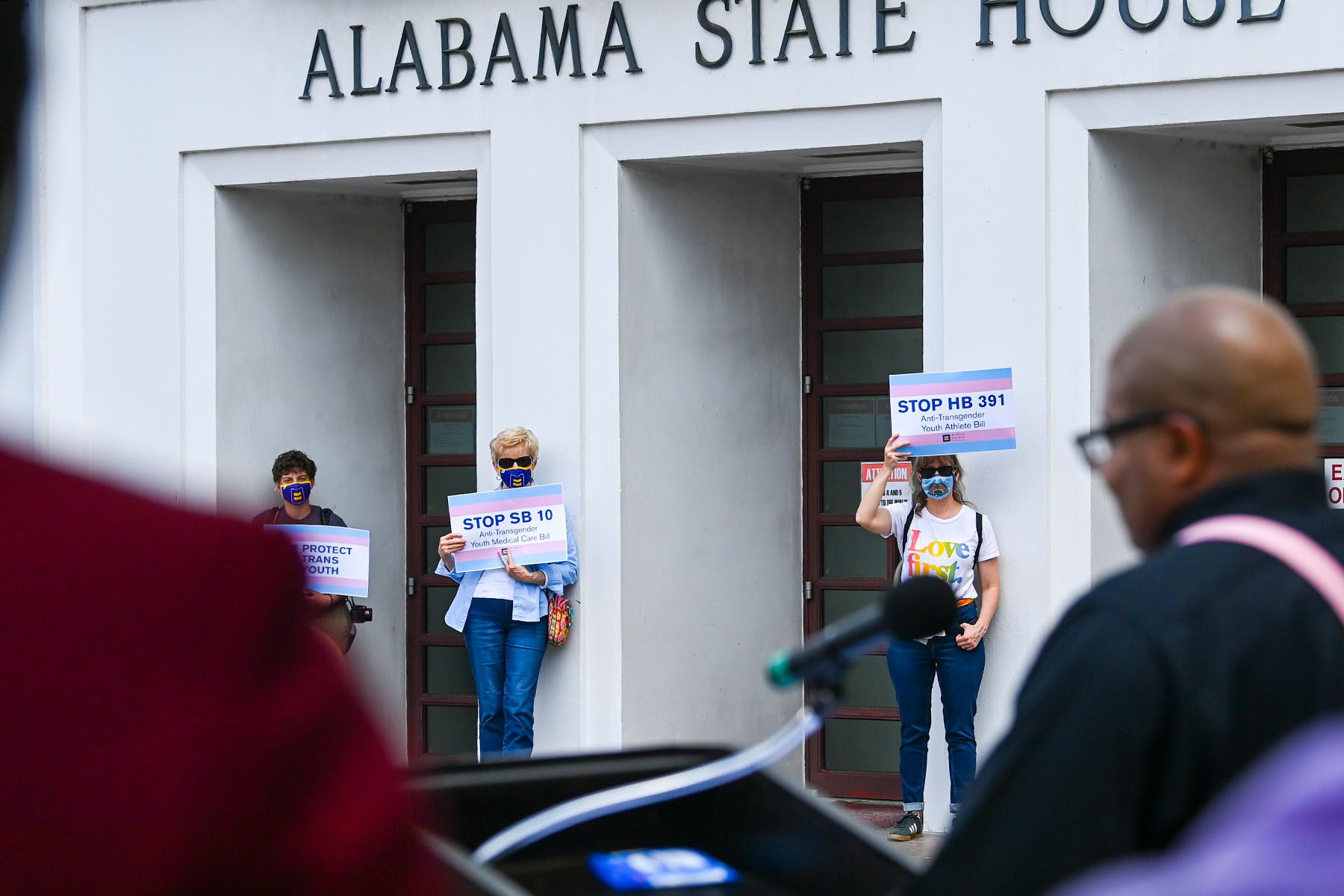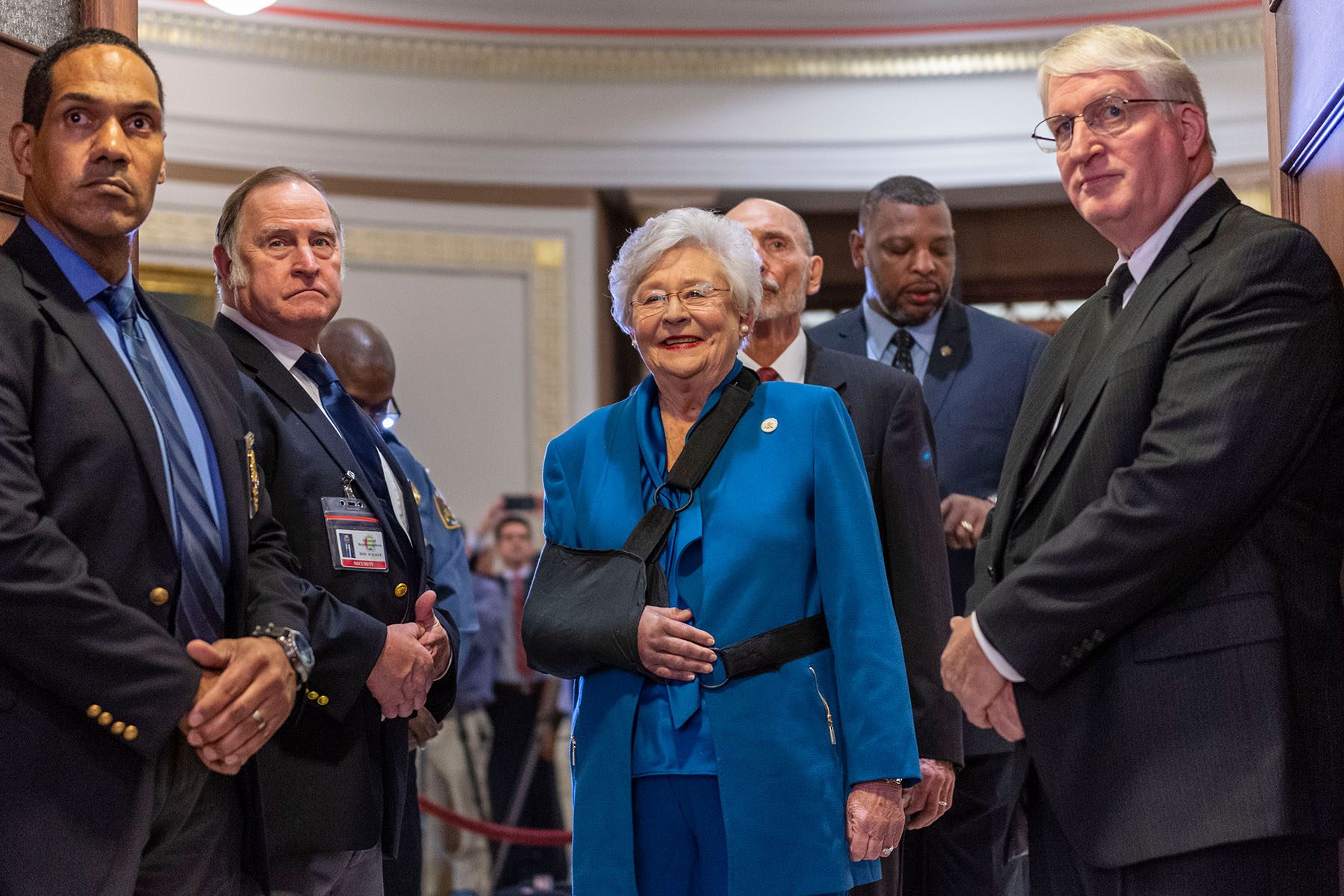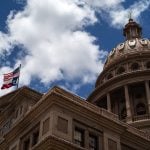On the last day of Alabama’s legislative session, lawmakers sent two anti-transgender bills to Gov. Kay Ivey’s desk — an 11th-hour move that shocked the state’s LGBTQ+ advocates.
One measure classifies gender-affirming medical care for transgender youth as a felony. The other requires students to use bathrooms and locker rooms based on sex assigned at birth rather than their gender identity. That bill passed with an amendment that also prohibits public schools from teaching or allowing classroom discussion on sexual orientation and gender identity for kids in kindergarten through the 5th grade.
Ivey, a Republican, signed both bills on Friday. In a statement, the governor appeared to say that she does not believe transgender people exist — ”if the good Lord made you a boy, you are a boy, and if he made you a girl, you are a girl.” A spokesperson did not immediately respond to a request for comment.
Both laws go into effect 30 days after being signed, though legal battles are expected. The ACLU, Lambda Legal, and the Transgender Law Center plan to challenge Alabama’s ban on gender-affirming care in court. The Southern Poverty Law Center (SPLC), National Center for Lesbian Rights (NCLR), Human Rights Campaign and other advocacy groups are mounting a separate lawsuit on behalf of two medical providers in the state, as well as several families.
The passage of the gender-affirming care ban especially took advocates by surprise. This was the third year in a row that Alabama lawmakers have debated a bill, sponsored by state Sen. Shay Shelnutt, to make gender-affirming care like puberty blockers and hormone treatment for trans youth a felony.
As of last week, advocates on the ground did not expect the state’s ban on gender-affirming care to even make it to the floor for a debate, said Dillon Nettles, policy and advocacy director for the ACLU of Alabama, who frequently works from the Alabama state house.
Along with health care restrictions, the gender-affirming care ban also requires school counselors and teachers to inform parents if their children come out as transgender.
“Ultimately, I think that proponents of this legislation were able to put pressure on the leadership, and they were able to get the leadership to supplement their agenda even if that put trans youth in the state at risk,” Nettles said.
In another surprise on Thursday, Shelnutt introduced a teaching amendment to the state’s bathroom bill. The amendment mirrors Florida’s bill on classroom discussion of LGBTQ+ issues, called the “Don’t Say Gay” bill by advocates, signed into law last month. Nettles found out about that amendment about 24 hours before it passed.
Nettles, as well as Carmarion D. Anderson-Harvey, Alabama state director for the Human Rights Campaign, attributed the bills’ success this year to election season in the state.
“This year, it was really more centered around political scoring,” Anderson-Harvey said. “We’re all distraught right now … because we were caught by surprise.”
Ivey, who signed the state’s bill restricting trans students from playing on sports teams that match their gender identity last year, campaigned on that bill ahead of the state’s gubernatorial race this November. Shelnutt is also running for reelection in the Alabama Senate. Shelnutt’s office did not return requests for comment.
Dr. Morissa Ladinsky, an associate professor of pediatrics at the University of Alabama who provides gender-affirming care to trans youth in Alabama and surrounding states, has gotten used to rallying against legislation that could jeopardize her work and her patients.
“To stop a very successful course of medical therapy without a medical indication to do so violates a major tenet of the ethics of our profession,” she said. “I have to decide whether to violate ethics, violate the standards of care of my profession, or risk a felony charge.”
Ladinsky is one of the medical providers represented in the lawsuit filed by the NCLR, SPLC and Human Rights Campaign if the bill is signed into law. The Gender Health Clinic that she helps oversee currently provides puberty blockers to 30 to 40 youth in Alabama, and hormone therapy to well over 100 patients, she said. The process for trans youth to start puberty blockers or hormone therapy is “a long journey,” she added. ”It doesn’t happen quickly.”

Even if the state’s ban on gender-affirming care for minors is quickly blocked in a lawsuit and ultimately does not come to pass, Ladinsky said she is worried that trans youth in the state will still suffer from worsened mental health and be more prone to attempt suicide as a result of the legislation passing.
“Gender-diverse kids in this state have manifested a level of anxiety that’s much higher, just in anticipation of what could happen,” she said.
Since last summer, Ladinsky said that she and other members of her gender health clinic have been called in more frequently by their emergency department and psychiatry unit colleagues to respond to suicide attempts by trans youth.
“Since last summer, we’ve been seeing one or two a month. In January we consulted on six different kids,” she said. She attributes the increase to anxiety surrounding anti-trans legislation and youths’ fears that their families will not accept them, as well mental health issues related to dealing with the pandemic.
Dina Marble, counselor for middle and high schoolers in Birmingham, met with three of her trans and nonbinary students on Thursday afternoon to try and reassure them that they would not be outed to their parents.
“They’re worried that teachers are going to be required to out them,” she said. “One of the students told me their big sister told them that if their parents found out they were trans, the fear would be that they would get kicked out of the house.” That student is 12, she said.
In Arkansas, the only other state that has successfully passed a law to criminalize trans youth receiving gender-affirming care through puberty blockers and hormone therapy, the law was blocked in federal court before it could take effect. Arkansas appealed that ruling to the Court of Appeals for the Eighth Circuit earlier this year.
Hannah Willard, vice president of government affairs for Freedom for All Americans, said that the organization — which tracks anti-LGBTQ+ bills — has noticed an increase in last-minute additions to anti-trans and anti-LGBTQ+ bills.
In Utah, an overhaul of an anti-trans bill became part of the basis of the governor’s veto against that now-enacted bill to bar trans students, especially trans girls, from competing in school sports that match their gender identity.
The White House denounced the Alabama bills on Thursday and reiterated last week’s warning from the Justice Department that policies and laws blocking medically-recommended care for trans youth may violate federal law.
On top of multiple lawsuits already announced against the bills, Ladinsky views Alabama as a potential ground for what the federal government can and is prepared to do to respond to anti-trans legislation.
“Right now it feels really scary to see my state and my kids elevated to the litmus test for it,” she said.







